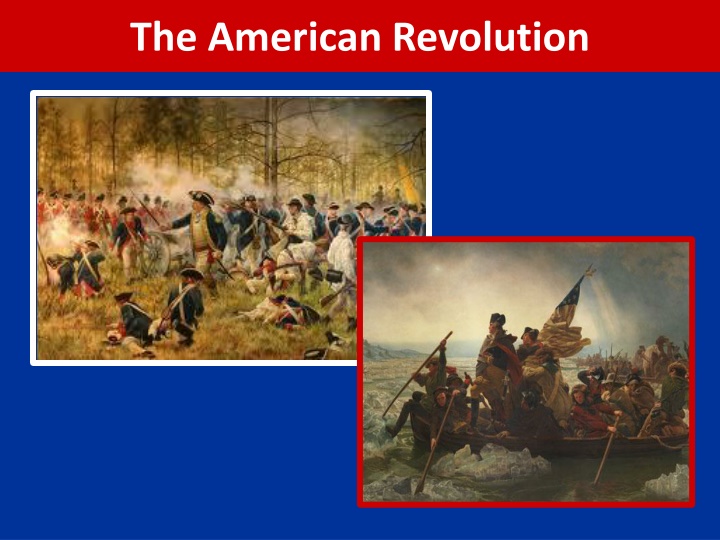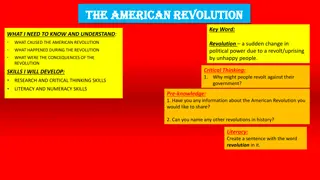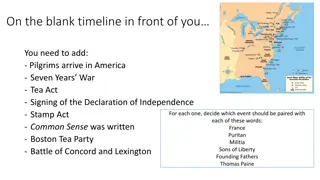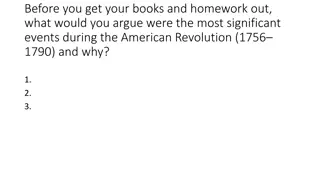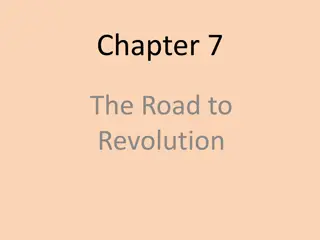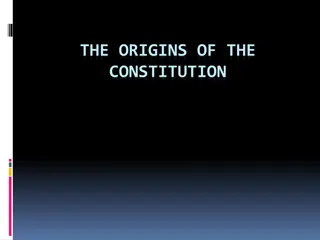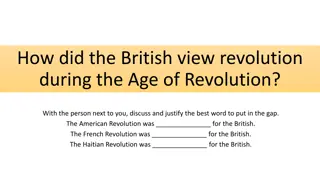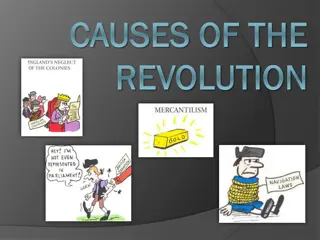Insights into the American Revolution
The American Revolution marked a pivotal time in history with events such as Lexington & Concord, the Declaration of Independence, British disadvantages, lessons learned, and key figures like George Washington. Discover the challenges, victories, and impact of this transformative period.
Download Presentation

Please find below an Image/Link to download the presentation.
The content on the website is provided AS IS for your information and personal use only. It may not be sold, licensed, or shared on other websites without obtaining consent from the author.If you encounter any issues during the download, it is possible that the publisher has removed the file from their server.
You are allowed to download the files provided on this website for personal or commercial use, subject to the condition that they are used lawfully. All files are the property of their respective owners.
The content on the website is provided AS IS for your information and personal use only. It may not be sold, licensed, or shared on other websites without obtaining consent from the author.
E N D
Presentation Transcript
Lexington & Concord, 1775 April 17, 1775 = British troops march to two towns to remove stockpile of weapons Paul Revere, The British are Coming! 70 British killed, over 170 wounded
Important Events in 1775 2ndContinental Congress met in Philadelphia Rejection of Olive Branch Petition
Declaration of Independence, 1776 90 towns drafted declarations June 1776 August 1776 Thomas Jefferson inspired by John Locke King referred to as He
British Disadvantages Lack of supplies in the colonies Larger span of land to fight (Canada to Florida) Lack of British soldiers Hessians hired to fight French entered war in 1778 Fought against an American guerilla army Assumed Loyalists would help fight the war
Lessons Learned from The War U.S. needed a more centralized government U.S. needed to overcome regionalism Continental Congress had to: Govern 13 states Worry about finances Conduct diplomacy Create & Supply an Army
Picking a Commander-in-Chief Could New England militia men trust a Southern officer? John Hancock vs. George Washington John Hancock George Washington
George Washington New Englanders are an exceedingly dirty & nasty people.
Battle of Saratoga, NY British General Burgoyne 1,200 British men dead or wounded October 17, 1777 = Burgoyne surrendered American victory convinced France to join on our side
Valley Forge, Winter of 1777 1778 2,000 Americans deserted 2,000 died from illness Army ran out of food and supplies
Supply Shortage Continental Congress could not force states to supply food, soldiers, blankets 2 million pounds of beef, 2 million pounds of flour, 2 million tons of hay needed every 3 months Baron von Steuben of Prussia trained the incompetent Patriots Soldiers often deserted before completion of 1 year of service
Financial Instability High inflation in the colonies States and U.S. printed their own money Soldiers paid in I.O.U.s & Land Certificates
Frances Role in the War France recognized U.S. as a country Official alliance = Feb. 1778 Gave supplies, soldiers, naval power to block Britain from shipping supplies Marquis of Lafayette Lafayette
Georgia & South Carolina Britain moved south towards the end of the war Britain took control of Georgia & Charleston, South Carolina Worst battles for U.S. in South Carolina
Benedict Arnold 1779 = Traded information with British General Clinton Tried to sell West Point Fort in New York to the British 1780 = Arnold s plan captured Treason increased patriotism
Surrender at Yorktown French navy blocked coastline of Virginia 16,000 French and American troops vs. 7,500 British 12 day battle General Cornwallis surrendered in October 1781
Treaty of Paris Not signed until 1783 Ben Franklin, John Adams, John Jay negotiated for U.S. U.S. got all land up to Mississippi River British withdrew troops Allowed to collect debts Benjamin Franklin John Adams
Why did the British lose? Logistical Issues Too worried about food to fight aggressively Inability to rule the areas captured French assistance
